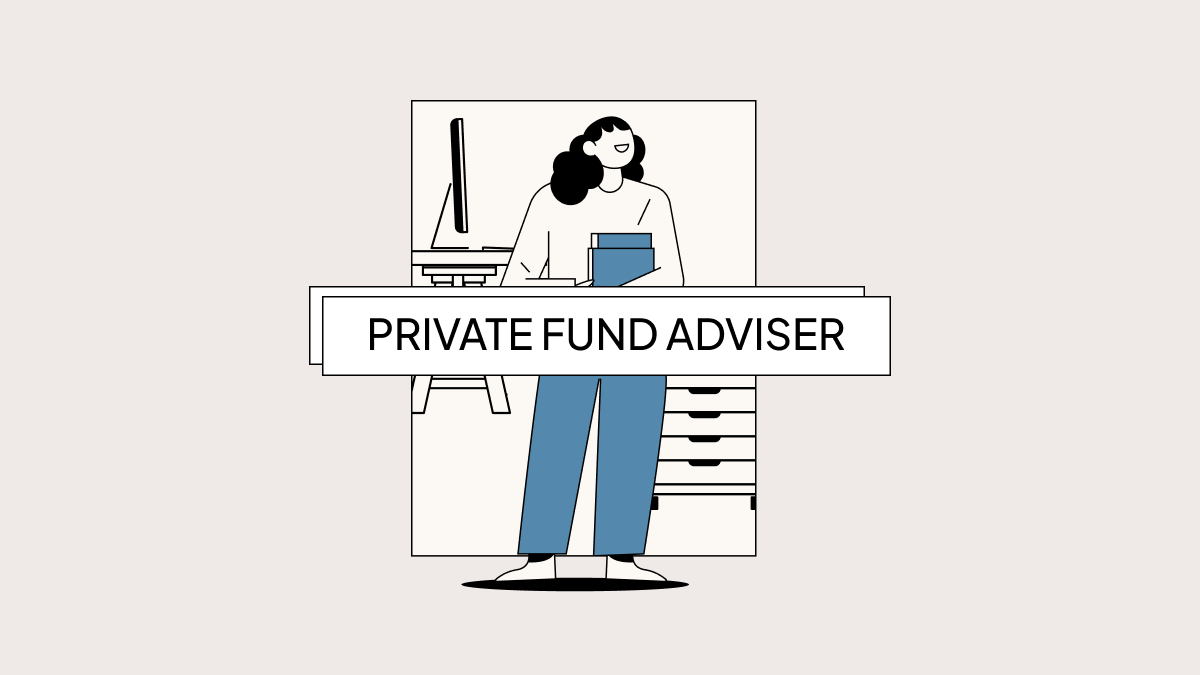In August 2023, the SEC finalized a set of rules governing the behaviors of private fund advisers, collectively known as the Private Fund Adviser rules.
The Private Fund Adviser rules impose new restrictions and requirements on private fund advisers. Some of the rules apply only to SEC-registered investment advisers (RIA), while others apply to all private fund advisers, including exempt reporting advisers (ERA). Taken together, the rules force major changes to the way fund managers conduct their business.
Background of the Private Fund Adviser rules
The Investment Advisers Act of 1940 gives the Securities and Exchange Commission (SEC) the authority to regulate private fund advisers.
Depending on the adviser’s AUM (assets under management) and investment practices, they may be required to register with the SEC or with a state securities regulator. If they meet certain criteria, an investment adviser may instead file for exemption from SEC registration as an ERA. Regardless of whether or where a fund adviser is registered, they are still subject to all Advisers Act provisions and to SEC regulations.
Under the leadership of Gary Gensler, who became SEC chair in 2021, the SEC has increased its scrutiny of the private markets. Because the SEC lacks direct authority over private funds, the Commission has attempted to influence the sector by regulating the activities of the investment advisers who manage private funds, including private equity funds, venture capital funds, and funds of funds. The Private Fund Adviser rules are part of a broader series of rulemakings the agency has made during Gensler’s tenure to curtail the growth of the private markets.
What are the Private Fund Adviser rules?
The SEC divides the Private Fund Adviser rules into the following seven categories:
-
Preferential treatment
-
Restricted activities
-
Quarterly statements
-
Annual audits
-
Advisor-led secondaries
-
Recordkeeping
-
Compliance policy annual review
Only the first two categories affect both RIAs and ERAs. The rest of the rules affect RIAs only.
Timeline for compliance
The various parts of the rule go into effect on different timelines, depending on the adviser’s AUM.
|
Rule |
Advisers >$1.5B AUM |
Advisers <$1.5B AUM |
|
Preferential treatment |
September 2024 |
March 2025 |
|
Restricted activities |
September 2024 |
March 2025 |
|
Quarterly statements |
March 2025 |
March 2025 |
|
Annual Audits |
March 2025 |
March 2025 |
|
Advisor-led secondaries |
September 2024 |
March 2025 |
|
Recordkeeping |
As above. |
March 2025 |
|
Compliance policy annual review |
November 2023 |
November 2023 |
Rules for all private fund advisers
The new preferential treatment and restricted activities rules affect all private fund advisers, even those that are exempt from SEC registration.
Preferential treatment
Preferential treatment refers to offering special terms or access to a subset of investors in a private fund. Preferential treatment includes:
-
Special fund redemption rights
-
Access to information about portfolio investments, such as portfolio company financials
-
Separate material economic terms, including but not limited to fee breaks and coinvestment rights
The PFA rules prohibit advisers from granting preferential treatment relating to redemption or information rights if doing so could have a material, negative effect on the other investors in the fund or similar pool of assets, unless all other investors are offered the same terms.
In addition, the rules prohibit all other forms of preferential treatment (such as those for material economic terms), unless those terms are disclosed in advance of the investment.
Finally, the rules require advisers to make after-the-fact notification of any existing preferential terms they’ve established, and going forward, to make an annual notification to all investors in a fund of all existing preferential arrangements.
Other restricted activities
The PFA rules prohibit fund managers from charging certain expenses to funds without advance disclosure, or in some cases, without acquiring investor consent.
-
Disclosure requirements: Fund managers cannot charge regulatory, examination, or compliance fees to the fund without investor disclosure. In addition, fund managers may not charge fees or expenses related to a portfolio investment on a non-pro rata basis unless the allocation is “fair and equitable” and disclosed to all investors.
-
Investor consent requirements: Fees or expenses related to regulatory investigations require disclosure and investor consent. The rules also stipulate that when a fund manager is sanctioned for violating the Advisers Act, the adviser cannot charge any associated expenses to the fund.
Rules for SEC-registered investment advisers
The majority of the Private Fund Adviser rules affect only RIAs. These rules make new requirements in the following areas:
Quarterly statements
The rules require advisers to provide investors with standardized quarterly statements, and prescribe the way they report adviser compensation, fund fees and expenses, and investment performance.
Annual Audits
The rules require annual audits for every fund the adviser oversees, and for each fund’s audited financial statements to be delivered to investors.
Advisor-led secondaries
The rules make two new requirements for all adviser-led secondary transactions:
-
The adviser must obtain a fairness or valuation opinion from an independent third party
-
The advisor must disclose all business relationships and potential conflicts of interest between the adviser and the independent opinion provider, including the relationships of any related persons (e.g., employees) of the fund adviser
Recordkeeping
The rules require RIAs to maintain records of compliance with each of the above rules for a period of five years.
Compliance policy annual review
Under the new rules, RIAs must document their process for reviewing their compliance policies.
How Carta is helping fund managers prepare
Carta is building standardized quarterly statements for RIAs to use in their quarterly reporting to investors. The new standardized reports are compliant with the new quarterly statement guidelines under the Private Fund Adviser Rule.
Get the latest updates
Sign up for Carta’s Policy Weekly, a newsletter following the latest in policy developments affecting the private markets, including fund regulation.

